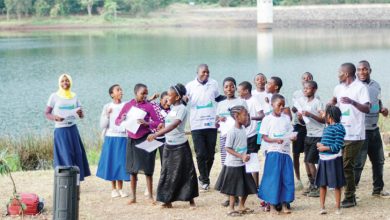Twinning vaccine with sanitation to end polio
Since 2022 when Malawi discovered its first wild poliovirus in 30 years, the country has rolled out mass vaccination against the crippling disease that mostly affects children aged below five.
The first case since the country announced kicking out polio was a three-year child in the capital city, Lilongwe.
The shocker moved the Ministry of Health to roll out supplementary vaccination campaigns for every child aged below five.
Now the campaign targets all children up to 15 years old following the detection of a 14-year-old polio case in Ndirande, a populous township in Blantyre City.
According to the World Health Organisation (WHO), polio is an incurable viral disease which attacks the nervous system and can cause total paralysis within hours among children under five years. The virus is transmitted mainly through hands, water or food contaminated by faecal matter.

Mwiza Mtawali, a clinical officer at Mangochi District Hospital, urges parents and guardians to ensure children receive the vaccine to boost their immunity to the re-emerging sanitation-related outbreak.
“Children are the future [of our nation] and having a large population paralysed with their brains affected and or dead doesn’t bid for a very bright future; hence, the need for a positive response to the vaccines,” he states.
In addition to vaccinations recommended by WHO, the disease, like the raging cholera outbreak that has killed 1 766 from nearly 59 000 patients since March 2022, can be prevented by sanitation and hygiene.
The Ministry of Health estimates that a breakdown in access to safe water, sanitation and hygiene accounts for slightly over half of outpatients treated in the country’s health facilities.
Sanitation matters
Since poliovirus is transmitted through contaminated human stools found in food or water, this brings into question the country’s sanitation status, especially efforts to end open defaecation.
Several studies link poor sanitation to polio, intestinal worms and widespread diarrhoeal diseases, including typhoid, cholera and dysentery.
Last week, Blantyre district health office immunisation coordinator Myless Mhango said the vaccination campaign is pivotal to safeguarding children in contact with contaminated stools due to poor hygiene.
“Community members have a role in improving the sanitation and hygiene practices and also get their children vaccinated to protect them from the paralysing disease,” she explained.
In 2018, government adopted a community-led total sanitation to end open defaecation nationwide and reduce sanitation-related diseases that drain the national healthcare budget, which is hugely donor-funded.
Amid mass vaccination campaigns targeting more than eight million children, the push to stop the spread of polio renews call to ramp up the fight against sanitation-fuelled disease. This falls in line with the global Sustainable Development Goal (SDG) six on access to clean water and sanitation for all by 2030.
Fear of the unknown
National efforts to address the disease by vaccinating all children under the age of 15 need not exclude community efforts to close sanitation and hygiene gaps.
The vaccination campaign is slowed by myths and misconceptions.
This prompted the Ministry of Health to train and engage community leaders, including chiefs and religious elites, to combat misinformation about the oral polio vaccine.
She says some guardians refuse to present their children to get vaccinated, citing repeated vaccination campaigns amid similar door-to-door immunisation exercises against Covid-19 and cholera. The emergency campaigns run parallel to the routine immunisation for every child below five.
“Considering some of the parent and guardians are not aware of the benefits of such vaccines, convincing them is a challenge, especially in rural areas. They require in-depth counselling to persuade them and help them understand the difference,” says Mtawali.
Elen Nambota got her one-year-old baby vaccinated during the launch of the four-day polio vaccination campaign in Ndirande on July 12.
She says heeding dos and don’ts from the Ministry of Health is key to protecting children’s health.
“I do not fear the vaccines because they protect us and our children from deadly disease outbreaks that threaten our future if we don’t adhere to the messages from the health workers.”




